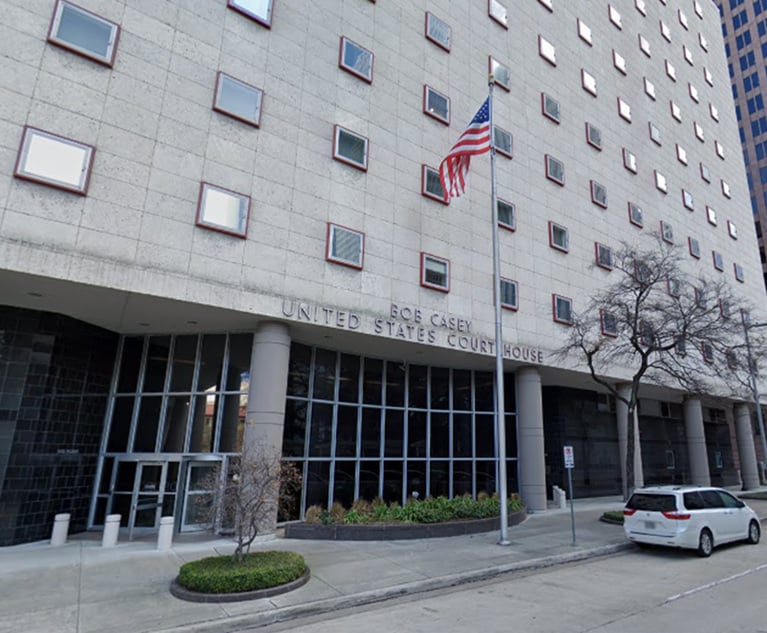Business Is Booming for Mediators as COVID-19 Cools Courts
"Business is dramatically increasing, as long as mediators are able to offer options for remote attendance," said Mark Lemke, incoming president of the Southern California Mediation Association.
April 02, 2020 at 04:48 PM
4 minute read
 Photo: Shutterstock
Photo: Shutterstock
Civil mediators are working nights and weekends to handle increasing numbers of cases from litigants seeking to sidestep courthouse slowdowns from the COVID-19 pandemic.
Many courts across the country have postponed jury trials, and judges face learning curves with the technology for remote hearings, which slows down business and forces courts to prioritize criminal cases, child protection matters, domestic violence protective orders and other urgent cases.
"Business is dramatically increasing, as long as mediators are able to offer options for remote attendance," said Mark Lemke, incoming president of the Southern California Mediation Association. "There really is a tremendous need for mediation right now."
The push to mediate is coming from judges in some instances.
"Our court capacity is limited," said 470th District Judge Emily Miskel of McKinney, Texas. "I'm able to accommodate a third of the amount of stuff I'd be able to hear."
Miskel has encouraged family law litigants to do remote mediations to work out temporary orders and co-parenting issues. She and her judicial colleagues have also put together and distributed a list of Texas mediators who are able to do remote sessions.
Courts might decide to make mediation mandatory, if government shutdowns and social distancing last into the summer, said mediator Hannah Stroud, an associate with Hanshaw Kennedy Hafen in Frisco, Texas.
"I haven't seen a big pickup yet, but I do see that coming down the pipeline," said Stroud, who has turned to Zoom video conferences for her mediations. "My feeling is it's going to be in the next three weeks, when we see more shelters-in-place, because Texas doesn't have a mandatory one now."
Equalizer
Florida litigator Harsh Arora, who is currently scheduling a remote mediation in one of his cases, said that before the coronavirus outbreak, he didn't get a high success rate from remote mediations, which usually happened when one litigant was in another state or country.
Now, COVID-19 is creating a different perspective because no one knows when the courts will reopen for trials, which makes it harder to walk away from the negotiating table. Also, some plaintiffs and defendants are facing a financial crunch.
"When you have this level of uncertainty, and people are looking at various loan options, grants and other ways to save their businesses from going under, they are very motivated," Arora said. "The playing field for remote mediations versus in-person mediations has been leveled."
Lemke, the mediation association leader, said that more clients are asking for mediation sessions on short notice. His firm, Lemke Mediation in Los Angeles, has started offering mediations during evenings and weekends, because litigants worried about losing their jobs are refusing to ask off of work to attend mediations.
"The increase that I am seeing, it's probably about a third increase," he said, adding that more litigants are settling their disputes, too.
Weekend work is also on the horizon for Suzanne Wooten, a mediator and arbitrator at North Texas Litigation Solutions in McKinney who's scheduled five sessions this week and seven next week.
But she's afraid the number will decrease over time because of the economic harm from the virus crisis.
"I'm running into more people, as time goes by, who cannot afford to go to mediation because they are not earning any income," Wooten explained, adding that litigants who can't afford mediators also can't pay lawyers. "The question is, how will the work be compensated? We all have to pay all of our bills."
Related stories:
Mediation Thrives in Virtual Conference Rooms as Virus Blocks In-Person Meetings
How the COVID-19 Crisis Is Reshaping Alternative Dispute Resolution
Video Conferencing and Mediating Complex Disputes in the New Normal: Settlements Don't Need to Wait
This content has been archived. It is available through our partners, LexisNexis® and Bloomberg Law.
To view this content, please continue to their sites.
Not a Lexis Subscriber?
Subscribe Now
Not a Bloomberg Law Subscriber?
Subscribe Now
NOT FOR REPRINT
© 2025 ALM Global, LLC, All Rights Reserved. Request academic re-use from www.copyright.com. All other uses, submit a request to [email protected]. For more information visit Asset & Logo Licensing.
You Might Like
View All
Conspiracy Suits Against Quinn Emanuel, Roc Nation Moved to Federal District Court

JCPenney Seeks Return of More Than $1.1M From Jackson Walker For Bankruptcy Work
3 minute read
Ex-Appellate Court Judges Launch Boutique Focused on Plaintiffs Appeals
2 minute read
O'Melveny, White & Case, Skadden Beef Up in Texas With Energy, Real Estate Lateral Partner Hires
5 minute readTrending Stories
- 1Uber Files RICO Suit Against Plaintiff-Side Firms Alleging Fraudulent Injury Claims
- 2The Law Firm Disrupted: Scrutinizing the Elephant More Than the Mouse
- 3Inherent Diminished Value Damages Unavailable to 3rd-Party Claimants, Court Says
- 4Pa. Defense Firm Sued by Client Over Ex-Eagles Player's $43.5M Med Mal Win
- 5Losses Mount at Morris Manning, but Departing Ex-Chair Stays Bullish About His Old Firm's Future
Who Got The Work
J. Brugh Lower of Gibbons has entered an appearance for industrial equipment supplier Devco Corporation in a pending trademark infringement lawsuit. The suit, accusing the defendant of selling knock-off Graco products, was filed Dec. 18 in New Jersey District Court by Rivkin Radler on behalf of Graco Inc. and Graco Minnesota. The case, assigned to U.S. District Judge Zahid N. Quraishi, is 3:24-cv-11294, Graco Inc. et al v. Devco Corporation.
Who Got The Work
Rebecca Maller-Stein and Kent A. Yalowitz of Arnold & Porter Kaye Scholer have entered their appearances for Hanaco Venture Capital and its executives, Lior Prosor and David Frankel, in a pending securities lawsuit. The action, filed on Dec. 24 in New York Southern District Court by Zell, Aron & Co. on behalf of Goldeneye Advisors, accuses the defendants of negligently and fraudulently managing the plaintiff's $1 million investment. The case, assigned to U.S. District Judge Vernon S. Broderick, is 1:24-cv-09918, Goldeneye Advisors, LLC v. Hanaco Venture Capital, Ltd. et al.
Who Got The Work
Attorneys from A&O Shearman has stepped in as defense counsel for Toronto-Dominion Bank and other defendants in a pending securities class action. The suit, filed Dec. 11 in New York Southern District Court by Bleichmar Fonti & Auld, accuses the defendants of concealing the bank's 'pervasive' deficiencies in regards to its compliance with the Bank Secrecy Act and the quality of its anti-money laundering controls. The case, assigned to U.S. District Judge Arun Subramanian, is 1:24-cv-09445, Gonzalez v. The Toronto-Dominion Bank et al.
Who Got The Work
Crown Castle International, a Pennsylvania company providing shared communications infrastructure, has turned to Luke D. Wolf of Gordon Rees Scully Mansukhani to fend off a pending breach-of-contract lawsuit. The court action, filed Nov. 25 in Michigan Eastern District Court by Hooper Hathaway PC on behalf of The Town Residences LLC, accuses Crown Castle of failing to transfer approximately $30,000 in utility payments from T-Mobile in breach of a roof-top lease and assignment agreement. The case, assigned to U.S. District Judge Susan K. Declercq, is 2:24-cv-13131, The Town Residences LLC v. T-Mobile US, Inc. et al.
Who Got The Work
Wilfred P. Coronato and Daniel M. Schwartz of McCarter & English have stepped in as defense counsel to Electrolux Home Products Inc. in a pending product liability lawsuit. The court action, filed Nov. 26 in New York Eastern District Court by Poulos Lopiccolo PC and Nagel Rice LLP on behalf of David Stern, alleges that the defendant's refrigerators’ drawers and shelving repeatedly break and fall apart within months after purchase. The case, assigned to U.S. District Judge Joan M. Azrack, is 2:24-cv-08204, Stern v. Electrolux Home Products, Inc.
Featured Firms
Law Offices of Gary Martin Hays & Associates, P.C.
(470) 294-1674
Law Offices of Mark E. Salomone
(857) 444-6468
Smith & Hassler
(713) 739-1250






